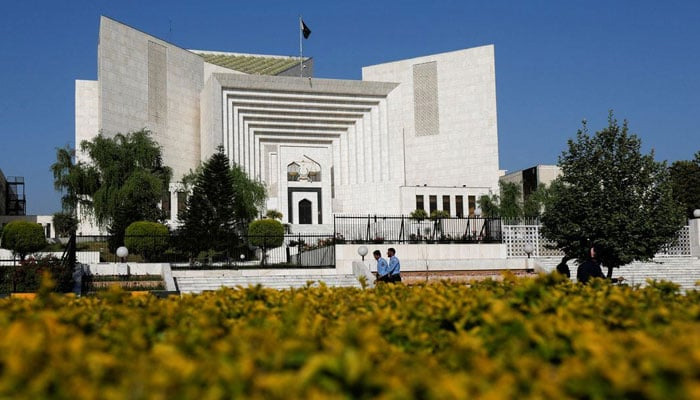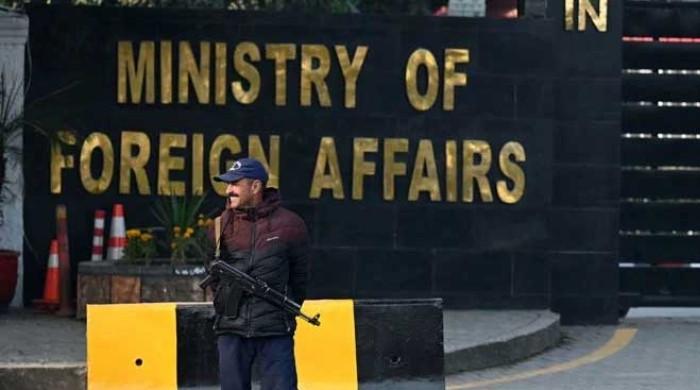'Master of Roster' concept alien to Constitution: Supreme Court
SC issues detailed verdict on SC (Practice and Procedure) Act 2023 case, decided earlier with a 10-5 majority
December 27, 2023

- Top court sustains law clipping CJP powers as “constitutional”.
- Verdict states term "Master of the Roster" is not in Constitution.
- Order says "Master" connotes servitude — a form of slavery.
ISLAMABAD: The Supreme Court on Wednesday issued a detailed verdict in the case pertaining to the law clipping the chief justice of Pakistan (CJP), stating that the "Master of Roster concept is alien to the Constitution" and cannot be considered above the charter even if it is a conventional notion.
The top court issued a detailed verdict in the SC (Practice and Procedure) Act 2023 case, which was decided in October, with a full court bench —comprising all 15 judges of the apex court — sustaining the law as “constitutional” with a 10-5 majority.
The apex court had struck down a section dealing with retrospective effect of the law, in its decision.
Five members of the bench — Justice Ijazul Ahsan, Justice Muneeb Akhtar, Justice Sayyed Mazahir Ali Akbar Naqvi,, and Justice Ayesha A Malik, and Justice Shahid Waheed — had opposed the law in their judgments on the pleas challenging the law.
By a majority of 8-7 — CJP Isa, Justice Sardar Tariq Masood, Justice Syed Mansoor Ali Shah, Justice Amin-ud-Din Khan, Justice Jamal Khan Mandokhail, Justice Athar Minallah, and Justice Musarrat Hilali dissenting — sub-section (2) of section 5 of the Act (granting a right of appeal retrospectively) was declared to be ultra vires the Constitution.
By a majority of 9-6 (Justice Ahsan, Justice Akhtar, Justice Yahya Afridi, Justice Naqvi, Justice Malik, and Justice Waheed dissenting) sub-section (1) of section 5 of the Act (granting a right of appeal prospectively) was declared to be in accordance with the Constitution.
Penned down by CJP Isa, the 22-page detailed verdict stated that the term "Master of the Roster" is not mentioned in the Constitution, any law, or even in the rules and that the Constitution doesn't empower the top judge to act completely in his discretion.
"The Master of the Roster concept is alien to the Constitution, and if it is considered to be a convention it cannot prevail over the text of the Constitution."
It stated that the term "Master" also connotes servitude, the extreme form of which is slavery, which is prohibited by the Constitution.
The verdict stated that servitude also negates consultation, in reference to specific Quranic verses that command consultation as an obligatory practice.
The verdict further stated that when power is concentrated in an individual, it invariably brings disastrous consequences.
"Irreparable damage is caused to the Judiciary and to the people of Pakistan when the legitimacy, integrity and credibility of the Judiciary is undermined. If the people lose their trust in the Judiciary, it will render decisions made by it mere words on paper, without credibility and moral authority. The surest way for this to happen is when cases are not decided in accordance with the Constitution."
The verdict termed the Act to be fully compliant with the Constitution, stating that it was reviewed in detail and it was observed that the Act has "facilitated access to justice, instilled transparency, made the realization of Fundamental Rights more effective, and the Supreme Court more independent."
SC (Practice and Procedure) Act 2023
The law gives the power of taking sou motu notice to a three-member committee comprising senior judges including the chief justice. It further aimed to have transparent proceedings in the apex court and includes the right to appeal.
Regarding the constitution of benches, the Act stated that every cause, matter, or appeal before the apex court would be heard and disposed of by a bench constituted by a committee comprising the CJP and the two senior-most judges.
It added that the decisions of the committee would be taken by a majority.
Regarding exercising the apex court's original jurisdiction, the Act said that any matter invoking the use of Article 184(3) would first be placed before the committee.
On matters where the interpretation of the Constitution is required, the Act said the committee would compose a bench comprising no less than five apex court judges.
About appeals for any verdict by an apex court bench that exercised Article 184(3)‘s jurisdiction, the Act said that the appeal would lie within 30 days of the bench’s order to a larger SC bench. It added that the appeal would be fixed for hearing within a period not exceeding 14 days.
The Act additionally said that a party would have the right to appoint its counsel of choice for filing a review application under Article 188 of the Constitution.
Furthermore, it states that an application pleading urgency or seeking interim relief, filed in a cause, appeal, or matter, shall be fixed for hearing within 14 days from the date of its filing.
However, the law had the provision that this right of appeal would also extend retrospectively to those aggrieved persons against whom an order was made under Article 184(3) prior to the commencement of the Act, but the court has struck it down.









